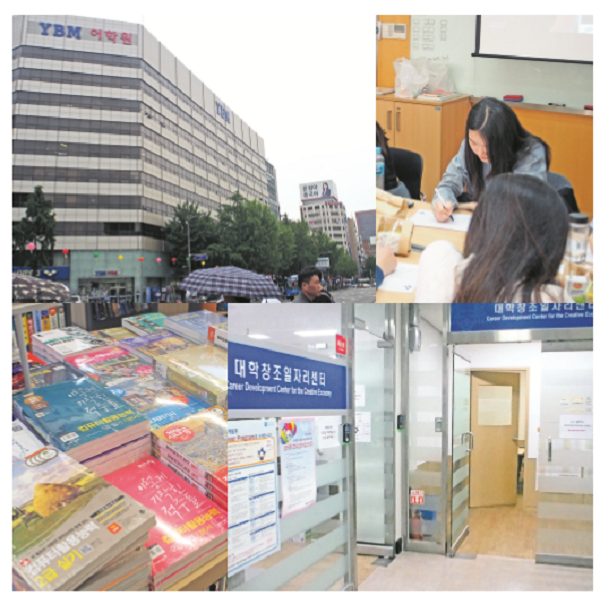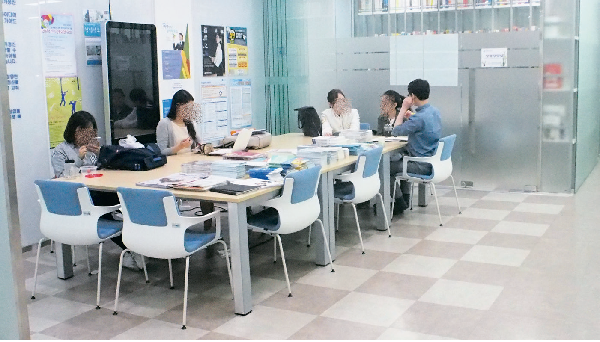
‘What would you most like to do in life?’ ‘How do you want to live?’ University students have been asked these questions continuously their entire life. Regrettably, even if a student has an answer to the questions, they are not likely to have truly reflected on the questions before responding. All people have dreams, but society regulates how they think. There is only one road to happiness.

Are You Sure You’re Free?
Unfortunately, according to the UN World Happiness Report 2015, the ’Freedom to Make Life Decisions' in Korea was only 0.33. ‘Freedom to Make Life Decisions' involves choice of direction in life, dreams, jobs, and so on. The closer to 1 the score, the greater the freedom one has to make life choices. This result emphasizes the dissatisfaction Koreans feel about their freedom to choose.
Most university students today are experiencing the rare opportunity to choice their occupations and life direction. According to a survey by the job portal website Saramin, among 1524 job seekers, 77% said they were considering preparing for the public servant recruitment exam. Also, a poll carried out on university students found that 83% of job seekers were preparing for the same exam.1) This tendency to prepare for the public servant exam has arisen from Korean society’s perception that it is better to seek economically stable jobs like well-established professions or public servant jobs over technicians or entrepreneurships. The main issue is that most students constrainedly follow society’s trends without genuinely considering what it is they really want to do with their lives. According to a survey by Weekly Chosun, among 37 job-seeking students in 3rd and 4th year at university, 34 said they are unable to do what they want in life. Among them, 14 students said, “They don’t know what they want to do.”2) While the remainder said they would not choose to follow their dream because of social position, others’ opinions, and fear of failure. In short, many university students are deprived of their freedom to make life choices because they face obstinate trends in society.

Victims of the Loss of Freedom
Tragically, university students, who follow the road society has placed before them, suffer huge losses to their happiness. In 2015, the number of students reentering vocational colleges after graduating from a traditional degree-granting university or withdrawing earlier has increased about 25% since 2012. One reason for this increase is that the unemployment rate of university graduates is 8.4% which is higher than the rate of students entering college.3) The other reason is disappointment about life after university. A large percentage of students do not feel their major at university matches their talent. Besides this, many students said the quality of classes at university is low. Many university students who decide to reenter a vocational college or a technical college feel that in addition to having already spent 4 years of their time and money on school, they have no choice but to add another 2 years to that burden. If the pressure to enter university after high school was reduced, people would have much more choices in life and less money and time would be wasted. Our lost freedom to think and make life decisions is causing a huge expense to people in terms of time and money.
University is also bearing the burden of this loss of freedom to choose. These days, universities have been criticized for losing academic value and becoming more of a job preparation institution. For example, Sookmyung Women’s University has recently decreased its number of liberal arts courses, and it has also reduced its apportioned number of students majoring in colleges of social sciences and law. It has also reshuffled its liberal arts requirements with little student body discussion and made an agreement to practice PRogram for Industrial needs-Matched Education (PRIME) business. Due to the trend in society to have universities become job preparatory institutes, national evaluation standard of a university in Korea has become the rate of graduating student employment. Therefore, universities have no alternative but to strengthen their career development institutes and increase programs that focus on job hunting. Consequently, forcing university students down a one-way road in life has led to universities losing their academic value and students’ trust.

Structure Changes Perception
To restore university students’ freedom to make life decisions, structural change is essential. The Korean government has already introduced several new regulations and created diverse opportunities for youth. One political strategy is to support students who want to create a new industry and another is to host a job creation contest, which would award and support creative young minds ready to create innovative business areas. However, these types of informative and professional help by the government for youth startup businesses are temporary and unstructured solutions; also, the programs are criticized for focusing solely on IT and other new technology industries, which cannot sustain long term competitiveness. Another topic of concern with these programs relates to scholarship grants. Students who have launched and are managing their own business cannot quit school because they will no longer be able to receive governmental support if they opt to leave school. Therefore, the government should reconsider its criteria when determining if the student is being a successful CEO and guarantee financial support as well as law and business-related information for at least 3 years.
Universities should also expand their roles and better equip students to make decisions on their own about their future. One solution could be making Futurology a basic curriculum requirement at all universities. Park Youngsuk, representative for the UN Future Forum, said, “People should learn futurology because information has changed and is being updated several times a day. Not knowing the future is like running 100 km in a state of blindness.”4) New technology is changing social structures in the job market, education, journalism, law, and other fields, people need to focus on creativity in order to survive and provide work that a machine cannot do. In the future, there will be more entrepreneurs and individual private business in which the owner is the CEO as well, so people need to create brand new jobs. Just like today’s smartphone application developer, a job that didn’t exist just 10 years ago, no one can guarantee popular jobs now will continue to be trendy. By learning futurology and speculating on future change, youth will be able to more efficiently criticize the present, learn expectations about possible changes in the future, and develop their future plan from a futuristic view.
Let’s Support the Creativity of Youth!
Even though structure is incorporated into the solution, little freedom to make personal choices originates from Korean society’s traditional ideas regarding relationships among people. In Korea, many people fear being excluded from the rest of society. They rather choose to be part of the socially fixed routine and misunderstand the concept of happiness. Koreans consider happiness the fruit of accomplishment; i.e., results come from moving from step to step like the move from high school to university, from university to company, and by passing an examination. However, there are many different ways one can achieve their goal in life. One’s job and such related “results” should not be the purpose behind living because that type of joy is temporarily. Making choices in life is how to live happily. Deciding what to do should come after making the right decision for you. Therefore, society’s perception of success should change; success is not fixed but varies according to the individual. Only once society’s idea has changed will individuals change their minds and start sensing the freedom to choice and make decisions on their own.
1) Jang Eunseok, “83% of University Students are Preparing for the Public Servant Examination… How to Attain a High Pass Rate Without Paying a lot of Money,” Seoul Newspaper, March 21st, 2016
2) Kim Hyojeong, “Are You Satisfied or Dissatisfied with Your Freedom to Choose What You Do With Your Life?” Weekly Chosun, January 13th, 2016
3) Park Jeongyang, “Why University Students Return to College,” News1, April 29th, 2015
4) Park Gilja, “With Eyes to See the Future, You Can See World trends,” Womennews, March 30th, 2016


